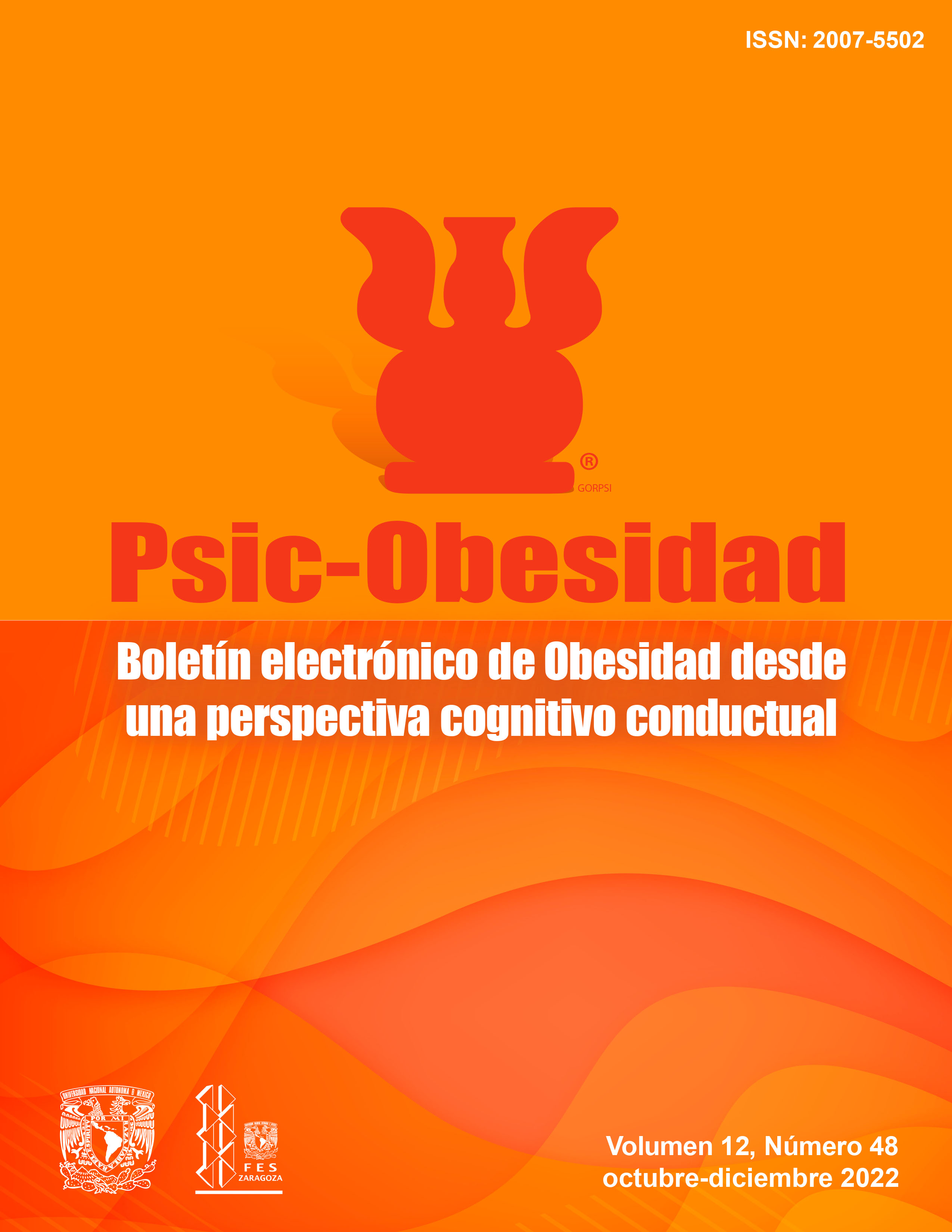Factors associated between obesity and old age
Main Article Content
Abstract
The body health condition with overweight and obesity shows a double risk to the individual, as a factor for the generation of other problems such as Diabetes or hypertension and in itself a risk factor in cancer and mental disorders such as binge eating. At any stage of development, obesity is a risky health condition that affects both women and men. In older adults it is related to cognitive, systemic-organic deficits and chronic degenerative diseases. The present work is a bibliographic review of the condition of obesity in elderly people and the related factors, among which are social, cultural, interpersonal relationships and lifestyle.
Downloads
Article Details
Citas en Dimensions Service
References
Bray, G. (2004). Medical consequences of obesity. Journal of clininal endocrinology and metabolism, 89 (6), 2583-2589. doi: 10.1210/jc.2004-0535. DOI: https://doi.org/10.1210/jc.2004-0535
Cserjési, R., Molnár, D., Luminet, O. & Lénárd, L. (2007). Is there any relationship between obesity and mental flexibility in children? Apperite, 49, 675-678. doi: 10.1016/j.appet.2007.04.001 DOI: https://doi.org/10.1016/j.appet.2007.04.001
Dahl, A. & Hassing, L. (2013) Obesity and cognitive aging. Epidemiologic Reviews, 35, 22-32. Doi: 10.1093/epirev/mxs002 DOI: https://doi.org/10.1093/epirev/mxs002
Encuesta Nacional sobre Salud y Envejecimiento en México (ENASEM). (2021). Presentación de Resultados de la Sexta Edición. https://www.inegi.org.mx/contenidos/programas/enasem/2021/ doc/enasem_2021_presentacion.pdf.
Fitzpatrick, A.L., Kuller, L. H., Lopez, O.L., Diehr, P., O’Meara, E.S., Longstreth, W.T. & Luchsinger, J.A. (2009). Midlife and late-life obesity and the risk of dementia: cardiovascular study. Archives of neurology, 66, 336-342. DOI: 10.1111/j.1532-5415.2004.52058.x DOI: https://doi.org/10.1001/archneurol.2008.582
Galioto, R., Alosco, M., Spitnagel, M., Stanek, K. & Gunstad, J. (2013). Cognitive reserve preserves cognitive function in obese individuals. Aging, Neuropsychology and cognition, 20 (6), 684-699. http://dx.doi.org/10.1080/13825585.2012.762972 DOI: https://doi.org/10.1080/13825585.2012.762972
Gunathilake, R., Oldmeadow, C., McEvoy, M., Inder, K., Schofield, P., Nair, B. & Attia, J. (2016). The Association Between Obesity and Cognitive Function in Older Persons: How Much Is Mediated by Inflammation, Fasting Plasma Glucose, and Hypertriglyceridemia? Journal of Gerontology. Series A, Biological Sciences and Medical Sciences, 71(12):1603-1608.https://doi.org/10.1093/gerona/glw070 P DOI: https://doi.org/10.1093/gerona/glw070
Han, C., Ahn Jo, S., Seo, J. A., Gwon, B., Hee Kim, N., Jo, Inho, Ho Park, M. & Woo Park, K. (2009). Adiposity parameters and cognitive function in the elderly: application of “jolly fat” hypothesis to cognition. Archives of gerontology and geriatrics, 49, 133-138. DOI: 10.1016/j.archger.2008.11.005. DOI: https://doi.org/10.1016/j.archger.2008.11.005
Organización Mundial de Salud (OMS-WHOa)(1 de octubre de 2022). Envejecimiento y salud. https://www.who.int/es/news-room/fact-sheets/detail/ageing-and-health
Organización Mundial de Salud (OMS-WHOb)(1 de octubre de 2022). Década del Envejecimiento Saludable (2021-2030). https://www.who.int/es/initiatives/decade-of-healthy-ageing
Ramírez-Alvarado, M. (2019). Relación entre obesidad, memoria y funciones ejecutivas en adultos mayores mexicanos. Tesis Maestría en Psicología. UNAM Inédita
Wang, C., Chan, J., Ren, L. & Yan, J. (2016). Obesity reduces cognitive and motor functions across the lifespan. Neural Plasticity, 1-13. doi.org/10.1155/2016/2473081 DOI: https://doi.org/10.1155/2016/2473081
West, A. & Haan, M. (2009). Body Adiposity in Late Life and Risk of Dementia or Cognitive Impairment in a Longitudinal Community-Based Study. Journal of Gerontology, 64, 103109. doi 10.1093/gerona/gln006 DOI: https://doi.org/10.1093/gerona/gln006




